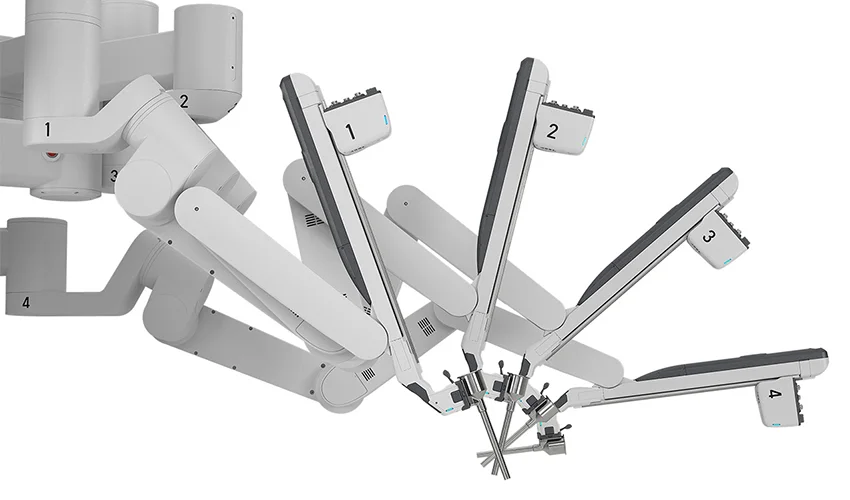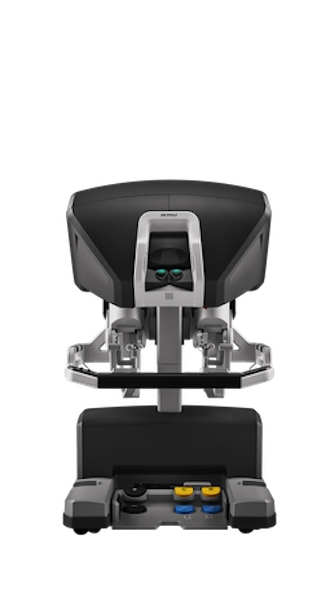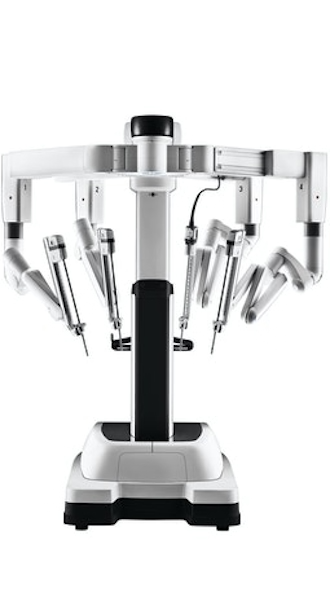

The state-of-the-art Da Vinci Xi robotic-assisted surgical system enhances intra-operative precision and patient care across multiple specialties. Powered by cutting-edge technology and guided by expert surgeons, robotic-assisted surgeries offer unparalleled advantages in Urology, Gynaecology, Colorectal, Hepatobiliary, and General Surgery.





The Da Vinci Xi system offers enhanced dexterity and maneuverability, allowing surgeons to perform complex procedures with unmatched precision, minimizing trauma to surrounding tissues and promoting faster recovery times for patients.

With 3D high-definition visualization and magnification capabilities, surgeons have a clearer view of the surgical site, enabling them to navigate with unprecedented accuracy and confidence.

Robotic-assisted surgery typically involves smaller incisions compared to traditional open surgery, resulting in reduced blood loss, less pain, and faster healing for patients.

Patients undergoing robotic surgery often experience shorter hospital stays and quicker return to normal activities, thanks to the minimally invasive nature of the procedure.

From prostatectomies to kidney surgeries, urology teams utilize the Da Vinci Xi system to perform intricate procedures with enhanced precision, resulting in improved outcomes for patients.

Gynaecological surgeons are at the forefront of minimally invasive techniques, offering advanced robotic-assisted solutions for hysterectomies, myomectomies and ovarian cystectomy.

With the Da Vinci Xi system, colorectal surgeons can perform complex colorectal surgeries with increased accuracy and control, leading to better outcomes and faster recovery for patients with conditions such as colon cancer.

From liver resections to gallbladder surgeries, hepatobiliary surgeons harness the power of robotic technology to address complex hepatic and biliary conditions with precision and efficiency.

Whether it’s hernia repair, gastric procedures, or other general surgical interventions, surgeons can leverage robotic assistance to deliver optimal results while minimizing patient discomfort and length of hospital stay.
At Pantai Hospital Melaka, we are committed to providing our patients with the highest standard of care through innovative technologies and skilled expertise. Da Vinci Xi robotic-assisted surgeries can redefine the surgical experience, offering safer, more effective treatments across a wide range of specialties.
Contact us today to learn more about robotic-assisted surgery and discover how we can help you achieve optimal health and wellness through advanced surgical care.
Make an appointmentThe Da Vinci Xi system is a state-of-the-art robotic platform used for minimally invasive surgery. It offers surgeons enhanced precision, flexibility, and control through robotic arms and a 3D high-definition camera, allowing for smaller incisions and potentially faster recovery times.
The Da Vinci Xi system can be used for a variety of procedures, including but not limited to:
Robotic-assisted surgery differs from traditional surgery in that it uses robotic arms controlled by the surgeon to perform the procedure through small incisions. This allows for greater precision, smaller scars, and often a shorter recovery time compared to traditional open surgery.
Costs can vary based on the procedure and hospital. It’s best to contact the hospital for detailed information on costs, insurance coverage, and payment options.
Coverage depends on your specific insurance plan. Contact your insurance provider to confirm whether robotic-assisted surgery is covered and to understand any out-of-pocket costs that may be required.
To schedule a consultation, please contact our hospital's direct line. We will arrange an appointment with one of our specialists to discuss your condition, the suitability of robotic-assisted surgery, and any questions you may have.
References:

